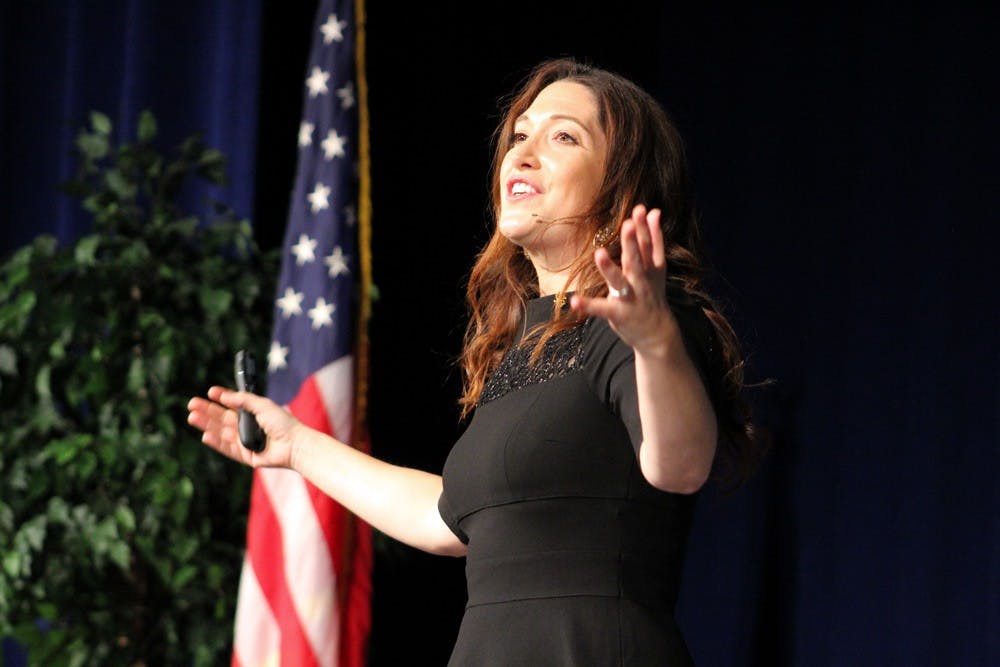Randi Zuckerberg wanted to sing on Broadway.
Little did she know that she would move on to become one of the most successful female entrepreneurs with a hand in the development of Facebook, her own production company and an author of three books.
“I didn’t take engineering classes, I didn’t know how to code,” Zuckerberg said. “I wouldn’t call myself a hacker. All it took was putting myself in a culture where I wasn’t afraid to fail.”
Zuckerberg spoke at the Distinguished Speaker Series Wednesday night at Alumni Arena. The businesswoman spoke about her experience with Facebook, the mobile workplace and how technology has become a staple in people’s lives to a fault.
Zuckerberg, after graduating from Harvard, went to California to help her brother Mark – the creator of Facebook – with his business in Silicon Valley, home of all things technology.
A small startup, the two wore many hats and worked tirelessly to move their college-central company into the big leagues. The siblings worked in different departments with Mark primarily in coding and interface and Randi involving herself in marketing.
“At Facebook, there was a culture that you didn’t have to wait for a boss to hand you something to do, you just did it,” Zuckerberg said.
She stayed in Silicon Valley for about a decade, finding success as Facebook and social media began to grow. Her goal was to see Facebook become a 24-hour news hub that allows users to be connected and informed at all times. As Facebook moved closer to this goal, Zuckerberg saw her time in the Valley as limited.
The entrepreneur also grew tired of the technology rhetoric she was constantly surrounded by. She calls Silicon Valley a “one industry city,” in which everyone is involved in technology, one way or another.
“You would go out for coffee and everyone would have their laptops out, pitching ideas,” Zuckerberg said. “Everyone worked in the industry. Even if they were a lawyer, they worked for a tech company, if they were a chef they worked for a tech company.”
She decided to move back to New York, where the arts flourished and conversation was no longer stagnant. She developed her own production company, Zuckerberg Media and became her own boss.
Lindsay Macaluso, a senior in the school of management, introduced Zuckerberg to the audience.
“Randi Zuckerberg is an icon for our time,” Macaluso said. “[Zuckerberg] is the kind of entrepreneur, the kind of leader that personifies the digital age.”
Once Zuckerberg moved out of the Valley, she began to seriously advocate for women as entrepreneurs and employees in the tech industry. Zuckerberg claims she always “talked the talk” when it came to women in the industry but was still working under someone else. Once she started her own business, it was easy for her to invest in other women.
She spoke about feminism and the role social media plays in the feminist movement.
“On one hand, I think it’s given a powerful megaphone to the movement. On the other hand, I think it’s given a megaphone to the haters,” Zuckerberg said. “I think we’re entering into the age of women, that this is a new era in history. It’s a really exciting time, with this historic election and everything we’re going into.”
Zuckerberg became an angel donor and 50 percent of her current investment portfolio is in women-run businesses.
Rachel Seah, a junior communication major, found Zuckerberg to be inspirational to not only women but people of all genders, races and ethnicities.
“Past speakers have been very serious, but I like how she engaged with the audience,” Seah said. “It went well with her idea of a techy world. She was great to listen to, it was really inspiring.”
The businesswoman also spoke about people’s current relationship with technology. She commented on how many people are constantly “plugged in,” which leaves little room for creativity or real emotional connection.
“Our relationship with technology isn’t healthy,” Zuckerberg said. “Our technology is coming in between the things we love, not bringing us closer.”
She gave the example of “hackathons” at Facebook, where all employees would stay up all night developing an idea they didn’t have time to work on during the week. It was at one of these hackathons she came up with the idea for Facebook Live, which is currently accessible to 1.5 billion people.
Zuckerberg also touched on mobile technology and the newfound ability to work remotely. This allows for anyone to be an entrepreneur or businessperson and opens opportunities for those who have stepped out of the traditional workplace setting.
Priyanki Nabaneethan, a senior business major, was happy she attended her first Distinguished Speaker event.
“I had no background of who she was beforehand, but she is an amazing, multitasking woman,” Nabaneethan said. “It was interesting to see her speak.”
Zuckerberg closed her speech by discussing virtual reality and new technology like 3D printing and self-driving cars. She warns that though these new inventions seem great now, there are repercussions to instant gratification.
The naturally talented entrepreneur ended with a song, a parody of “Part of Your World” with a technological spin. She also shared that she did in fact fulfill her dream of singing on Broadway when she was asked to guest star in “Rock of Ages” a couple of years ago.
Overall, Zuckerberg said it’s important to appreciate the technology people have without becoming consumed with it.
“I saw a self-driving car on the road in California and was alarmed,” Zuckerberg said. “But then I noticed that people who were driving cars were on their phones. We need technology to save us from technology.”
Tori Roseman is the managing editor and can be reached at tori.roseman@ubspectrum.com





